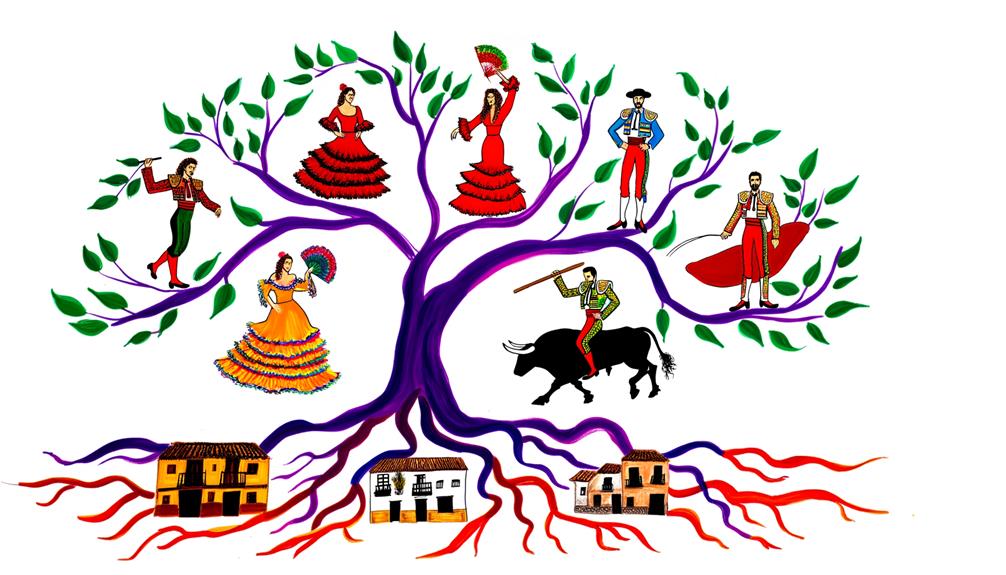Meaning of the Name Martinez
The surname Martinez derives from the given name Martin, based on the Latin Martinus, meaning 'of Mars' or 'warlike,' referring to the Roman god of war. The name signifies 'son of Martin' and emerged during the Middle Ages through the patronymic tradition.
Its prominence grew during the Reconquista and Spanish colonization, embedding deeply into the social fabric of the Americas. Martinez marks Spanish heritage, symbolizing martial prowess and lineage.
Figures like Pedro Martinez and Hector Martinez exemplify its widespread impact. To explore further, consider the global distribution of the Martinez name and its cultural significance across various domains.

Key Takeaways
- The surname Martinez means 'son of Martin,' derived from the Latin name Martinus.
- Martinus translates to 'of Mars' or 'warlike,' linked to the Roman god of war, Mars.
- Martinez evolved from the patronymic custom in Spanish-speaking countries during the Middle Ages.
- The name signifies a lineage with martial prowess and protection.
- Martinez is widely recognized and signifies Spanish and Latin American heritage.
Etymology and Origins
The surname Martinez, derived from the given name Martin, traces its etymological roots to the Latin name Martinus, which means 'of Mars' or 'warlike,' referencing the Roman god of war, Mars.
This surname evolved during the Middle Ages, a period marked by the patronymic custom where 'Martinez' signifies 'son of Martin.' It is particularly prevalent in Spanish-speaking countries, reflecting the widespread veneration of Saint Martin of Tours, a significant religious figure.
Etymologically, the name underscores attributes associated with martial prowess and protection. The suffix “-ez” is an Iberian patronymic marker, common in Spanish and Portuguese cultures, denoting lineage.
Therefore, Martinez encapsulates both historical reverence and linguistic tradition, embodying a rich cultural tapestry.
Historical Significance
Martinez not only reflects a lineage but also encapsulates significant historical narratives, as the surname is deeply intertwined with the cultural and societal developments of Spanish-speaking regions.
Originating from the patronymic tradition, 'Martinez' denotes 'son of Martin,' a name stemming from the Latin 'Martinus,' related to the Roman god of war, Mars.
This surname gained prominence in the medieval period, particularly during the Reconquista, when Christian forces reclaimed Iberian territories from Moorish rule.
The spread of the name coincided with Spanish colonization, embedding itself in the Americas' social fabric.
Consequently, Martinez serves as a historical marker, tracing the movement and influence of Spanish heritage across continents, underscoring a legacy shaped by conquest, migration, and cultural integration.
Cultural Impact
From literature to popular media, the surname Martinez has permeated various cultural arenas, symbolizing a rich tapestry of Spanish and Latin American identity. This name's cultural impact can be observed through:
- Literature: Authors frequently use Martinez to evoke a sense of heritage and authenticity, representing complex characters rooted in Spanish-speaking cultures.
- Cinema and Television: Characters named Martinez often embody Latino experiences, contributing to representation and diversity in storytelling.
- Music: Many Latin American musicians with the surname Martinez have brought traditional and contemporary sounds to global audiences, enhancing cultural appreciation.
- Sports: The name Martinez is prominent in international sports, particularly in soccer and baseball, where athletes serve as cultural ambassadors.
These instances underscore the significance of the surname Martinez within the broader cultural narrative.
Famous Figures Named Martinez
Building upon the rich cultural impact of the surname, numerous individuals named Martinez have achieved prominence in various fields, serving as notable figures whose contributions have left a lasting mark on history and society.
In the domain of sports, Pedro Martinez, a Hall of Fame pitcher from the Dominican Republic, is revered for his extraordinary baseball career.
In politics, Héctor Martínez, a Puerto Rican senator, has played a significant role in legislative developments.
The arts have also seen influential Martinezes, such as Oscar Martinez, an Argentine actor acclaimed for his performances in film and theater.
These figures exemplify the diverse ways in which the Martinez surname has been etched into the annals of various professional domains.
Global Distribution
Throughout history, the surname Martinez has spread across the globe, reflecting patterns of migration, colonization, and cultural exchange. Originating from the Iberian Peninsula, the name spread mainly through Spanish exploration and conquest during the Age of Discovery.
Today, Martinez is widely recognized in various regions, showcasing its global reach:
- Latin America: Countries such as Mexico, Argentina, and Colombia have significant populations bearing the surname, a reflection of Spanish colonial influence.
- United States: Immigration waves in the 19th and 20th centuries saw many Martinez families establishing themselves, especially in states like California and Texas.
- Europe: While primarily found in Spain, the surname also appears in France and Portugal due to historical proximity and movement.
- Philippines: Spanish colonization introduced Martinez to the archipelago, where it remains a commonly used name.
Conclusion
The surname Martinez, rooted in the Latin 'Martinus' and signifying 'son of Martin,' holds profound historical and cultural significance globally.
Originating from the Roman god Mars, it is emblematic of martial valor. Remarkably, the name's prevalence is striking, with over 1.5 million bearers in the United States alone.
This widespread distribution underscores its enduring legacy and societal impact, highlighting the deep-seated historical connections and cultural resonance embedded within the name Martinez.






